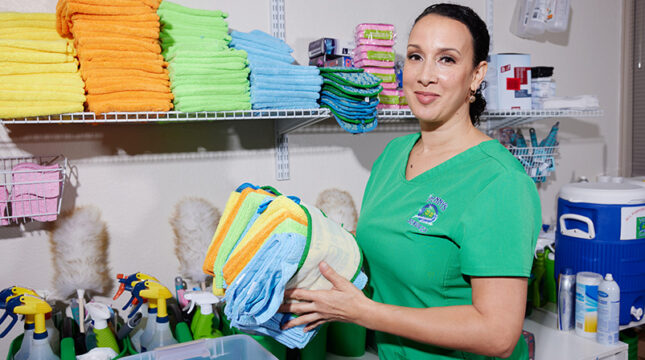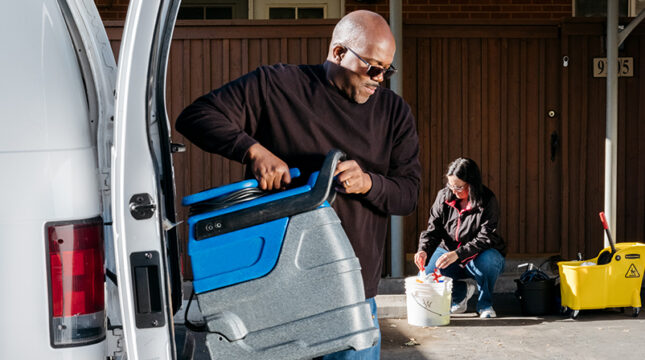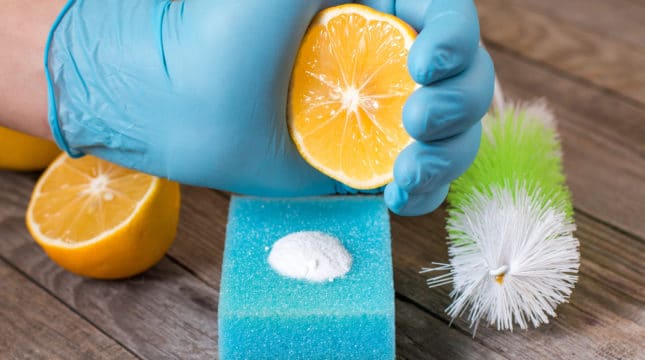What is cleaning and maid service insurance?
Residential cleaning isn’t known as a risky industry, so you’re probably wondering why insurance exists for it. Like any other job, risks exist, and house cleaning and maid service insurance can protect against claims that may be brought against your business.
It can pay to repair or replace a client’s belongings if you (or your employee) damage them. Cleaning insurance can also cover your equipment, commercial vehicle and slip-and-fall accidents.
Is cleaning insurance for self-employed house cleaners and maids required?
There isn’t a simple answer to this question. It depends on the state where you do business and how you operate your business.
For example, most states have laws that require workers’ compensation coverage in specific situations, but they may not require general liability insurance.
But cleaning insurance can do more than provide financial protection — it can also help you market your business. It signals stability and responsibility to your clients, can help you grow your business and position you for cleaning business success.
What insurance do house cleaners and maids need?
Even if the law doesn’t require it in your state, house cleaning and maid insurance can protect you and your business in multiple ways:
If you drive to and from clients’ properties
Being a house cleaner or maid means driving to and from clients’ homes. What happens if you get into an accident? Or you need a tow because your car breaks down? Your personal auto insurance may not cover it because it was for business-related purposes.
But commercial auto insurance can help. It can pay for repairs to your vehicle, medical expenses if someone is injured, property damage, legal fees and gap coverage on financed and leased vehicles.
If you have a physical location
If you run your house cleaning or maid business out of your home, you can probably get away without having commercial property insurance.
But if you have a commercial space, such as an office, it’s worth getting this type of coverage. It helps protect your business supplies, equipment and building in the event of theft, building damage, system failures (electrical, plumbing, etc.), and other possible mishaps.
If you break or damage a client’s property
General liability insurance helps protect you from claims by customers who allege you broke something while cleaning. This coverage can help replace or repair the broken item. If they sue you, general liability insurance can also help pay legal fees associated with defending yourself against these accusations.
If a client slips and falls on your freshly mopped floor
General liability can protect against accidents, too. For example, if a client slips on a floor you’ve just mopped, your business could be held liable for damages. A general liability policy can help protect you against such lawsuits.
If you use your own cleaning equipment
Tools and equipment insurance helps protect your equipment and supplies from damage and theft. For example, if your floor cleaner gives out right after the warranty expires or someone swipes your tools and supplies out of your car, tools and equipment coverage can pay to repair or replace your items so you can get back up and running quickly.
If you have employees
Many cleaning businesses are single owner/operators and may not require additional coverage.
But if you have employees, state laws are very clear about having workers’ compensation insurance. As with just about everything else, those laws vary by state, and that includes how many employees a business must have before they’re required to carry this insurance.
For example, if you’re starting a house cleaning business in California, you must have workers’ comp, even if you have just one employee. In Texas, however, employers aren’t required to have workers’ compensation insurance at all.
Do you need insurance if you work for a cleaning company?
Whether you’re a domestic cleaner or commercial cleaner, you should get cleaning insurance coverage to protect yourself and your business if you’re self-employed.
But what if you contract for someone else? That answer depends on the type of work you do and whether or not the employer carries insurance.
For example, if you work as an independent cleaner or contractor for a company, you’re considered self-employed — and you’re not covered under the business’s insurance. But if you’re an employee, the company’s cleaning insurance should cover any issues that might come up — it’s always good to check with your employer.
How NEXT helps self-employed house cleaners and maids
House cleaning and maid services are no different from any other business, in that they can be sued if something goes wrong. You deserve the peace of mind that comes with knowing your hard work is protected.
Running a small business can be a 24/7 job. That’s why NEXT gives you 24/7 DIY access to manage your coverage on your schedule. Simply answer a few questions, choose the package you need and get your certificate of coverage in 10 minutes or less.
Get a quote for cleaning business insurance today.





